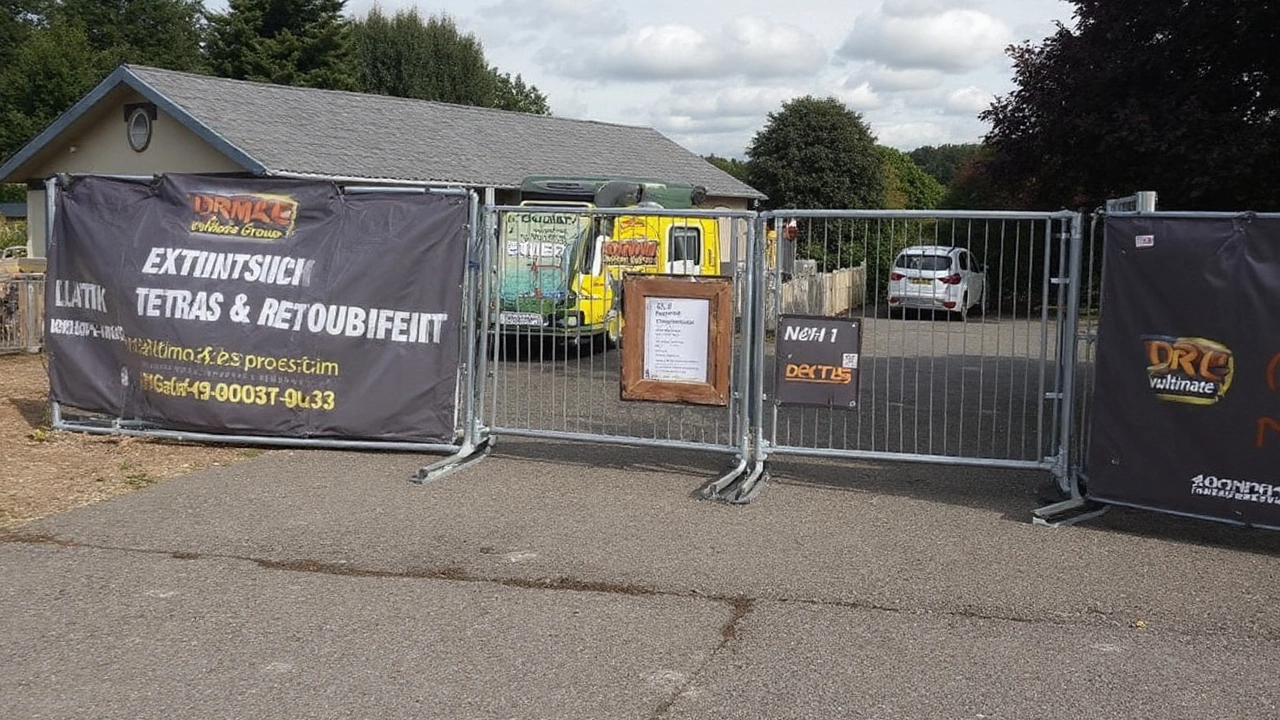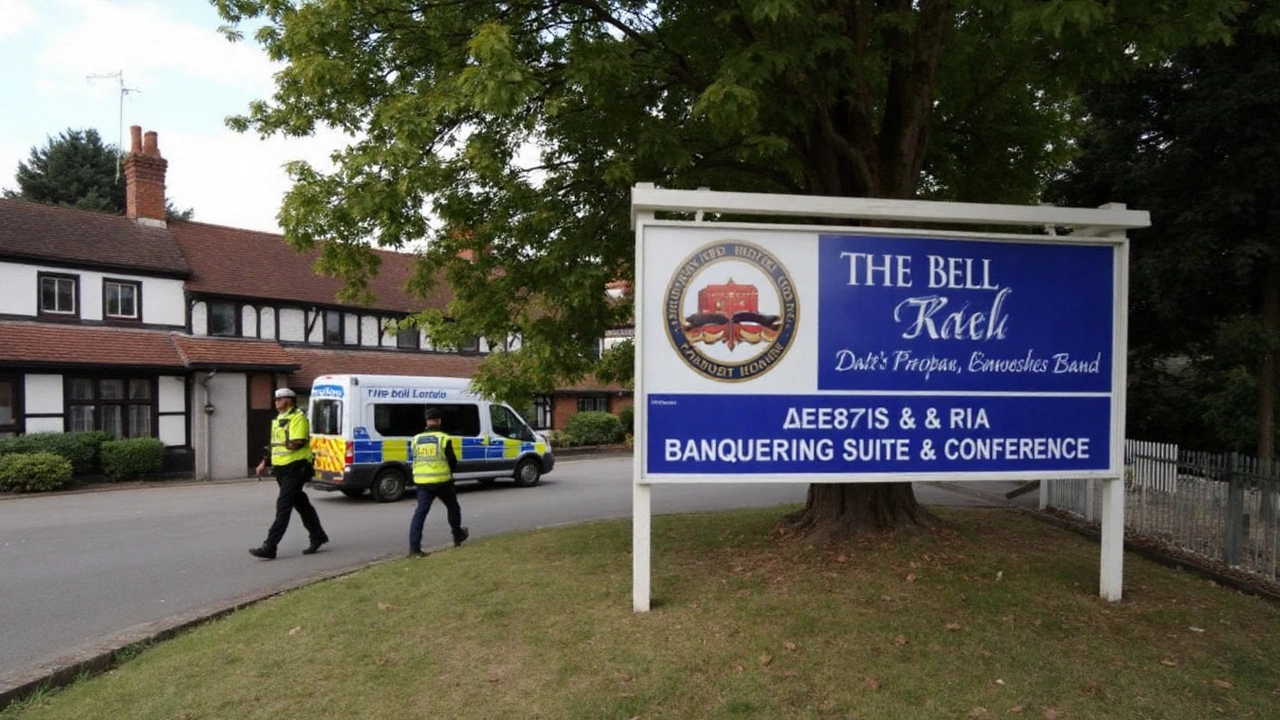Man pleads not guilty after hotel protests turn violent in Epping
A 52-year-old man has denied taking part in violent disorder during unrest outside a hotel housing asylum seekers in Essex. Phillip Curson, from Upminster in east London, appeared at Chelmsford Crown Court for a short hearing, confirmed his identity, and entered a not guilty plea. He wore a white shirt and black trousers and spoke only to address the judge and clerk. The court granted him conditional bail and set a case management hearing for September 22.
Curson is charged with one count of violent disorder linked to events on July 17 in Epping, Essex. Prosecutors allege he used or threatened unlawful violence during a demonstration outside The Bell Hotel, a site that has seen regular protests since mid-July. The allegation will be tested at trial. Until then, the bail conditions stand and the case moves into pre-trial management, where the court will set the timetable for evidence and future hearings.
The demonstration on July 17 started calmly but later turned ugly. Essex Police say there were scattered outbreaks of violence that targeted officers and property. Eight officers were injured. Police vehicles were damaged after objects were thrown. Officers in public order gear pushed crowds back from the hotel and made arrests as the situation escalated in the evening.
Police activity did not stop that night. Detectives have been reviewing footage and taking statements in the weeks since. As of Tuesday, 24 people had been arrested in connection with last month’s events in Epping, with 14 facing charges. Most of those arrests relate specifically to the disorder on July 17, when the protests briefly tipped from chants and placards into confrontation.
The protests began on July 13, days after an asylum seeker was charged over an allegation of attempting to kiss a 14-year-old girl. That case is separate and remains before the courts. The incident sparked anger locally and drew crowds to the hotel site on and off for days. Police tried to keep demonstrations away from the entrance and maintain a corridor for staff and residents, but numbers swelled at points and tensions rose.
Here’s the key timeline of what has happened:
- July 13: Protests start outside The Bell Hotel after a man is charged in a separate case involving a local teenager.
- July 13–16: Demonstrations continue at varying sizes. Police officers are deployed to manage the crowds and keep routes open.
- July 17: A larger protest begins peacefully before breaking into pockets of disorder. Eight officers are injured and police vehicles are hit by thrown objects.
- Late July–August: Arrests continue. Detectives gather witness accounts and video evidence.
- This week: Curson pleads not guilty to violent disorder. Conditional bail is granted. The next hearing is scheduled for September 22.
Violent disorder is a serious public order offence under the Public Order Act 1986. It involves three or more people who use or threaten unlawful violence in a way that would make a person of reasonable firmness fear for their safety. On conviction in the Crown Court, the maximum sentence is five years in prison, a fine, or both. Juries are asked to weigh what happened in the round — the scale of the crowd, behaviour of those charged, what was said or thrown, and whether the average bystander would have felt at risk.
Conditional bail means the judge was satisfied that the defendant can remain in the community before trial, subject to rules designed to protect the public and the integrity of the case. Courts commonly impose conditions like curfews, bans on contacting co-defendants or witnesses, or restrictions on entering certain areas. The specific conditions in this case were not read out in detail in open court.
The scene outside the hotel has become a flashpoint. Residents worried about safety have stood alongside others who say they want calm. Campaigners critical of Home Office policy have showed up too, sometimes clashing verbally with counter-protesters who support the asylum seekers. Most days passed without incident. July 17 did not, and that is why so much of the police focus now sits on that date.
Public order policing is a balancing act. Officers try to protect the right to protest while preventing intimidation and violence. That often means separating groups, issuing dispersal notices, or placing restrictions on routes and start times under public order powers. When missiles start to fly or the crowd pushes against police lines, the emphasis flips to safety and evidence gathering — documenting who did what, securing scenes where damage occurred, and identifying suspects from body-worn video and CCTV.
The hotel itself is part of a national story. The government has placed asylum seekers in hotels as a stopgap while cases are processed and longer-term housing is found. Ministers have repeatedly said they want to end hotel use, citing cost and community impact, but shifts take time and some sites remain in use as numbers fluctuate. Towns like Epping feel that acutely because a hotel sits in the middle of daily life — on the school run route, near the high street, within earshot of homes.
When protests stretch on, the strain spreads. Local traders see footfall dip when roads close. Bus routes get diverted. Families change routines to steer clear of shouting and police vans. Hotel residents, many of whom fled danger abroad, end up living with a constant ring of attention they did not choose. They are told to stay inside when protests grow, which can make people feel trapped. Volunteers and charities step in with food, clothing, and a listening ear, trying to keep life steady amid the noise.
The Crown Court will now start the steady work of case management. Prosecutors will set out the evidence they plan to use — witness statements, officer notes, any medical records from injured officers, repair invoices for damaged vehicles, and videos from phones and cameras. The defence will flag what is disputed, what legal arguments they may raise, and what further disclosure they need from police. The judge will fix dates and time estimates, and decide whether any expert evidence is needed, such as crowd dynamics or image analysis.
For people following the case, a not guilty plea simply means the question goes to trial. Juries in violent disorder cases are told to focus on individual conduct within the broader crowd. Being present at a noisy demonstration is not a crime. The line is crossed when someone uses or threatens unlawful violence, or joins in with those who do, and the overall scene would scare an average person nearby. That is the test the court applies, regardless of the cause or the slogans on the banners.
Essex Police say their investigation into the July disturbances in Epping is active and ongoing. With 24 arrests and 14 charges, there are likely to be more court dates ahead for others too. Officers have also stepped up patrols around the hotel on protest days to deter further disorder and reassure residents. Community leaders have urged people to make their views known peacefully and to leave any criminal matters to the courts.
The next moment to watch is September 22, when lawyers return to court and the judge checks progress. If both sides are ready, a trial window could be set. If more time is needed for disclosure or legal argument, the court will adjust the timeline. For now, the charge is denied, the case is live, and the focus shifts from the street to the courtroom — where the events of that July evening will be unpacked in full, witness by witness, frame by frame.
The story that began outside The Bell Hotel — a local dispute about safety, a national argument about asylum policy, and a night that tipped into violence — will continue to run. What happens next will be decided not by the loudest crowd, but by a jury hearing the evidence under the law. That’s where the heat gives way to facts and the noise makes room for judgment. For Epping, the hope is simple: peace on the pavement, and answers in court around the Epping protest.

What violent disorder means — and what comes next
Violent disorder sits between affray and riot in the public order scale. It does not allege an organised riot or mass criminality; it alleges that enough people crossed the line that a bystander would be fearful. The prosecution does not need to prove that every person acted identically, only that the collective behaviour met the legal threshold and that the defendant took part by action or threat.
Sentencing, if it ever arises, depends on the harm and the role played. Courts look at injuries caused, damage done, whether weapons or missiles were used, and whether the defendant led others, encouraged violence, or got swept along. First-time offenders who played a lesser role may see community orders or suspended sentences. Those who led or used serious violence risk prison. None of that is on the table unless and until there is a conviction.
Until the September hearing, the court process is largely administrative. Defence lawyers will meet their client, review footage, and take instructions. Prosecutors will sift more video, firm up timelines, and prepare exhibits. The judge will ensure the case stays on track and that both sides get what they need to present a fair case. The public will see the next steps as dates, brief updates, and, if it gets there, a trial listing at Chelmsford Crown Court.
